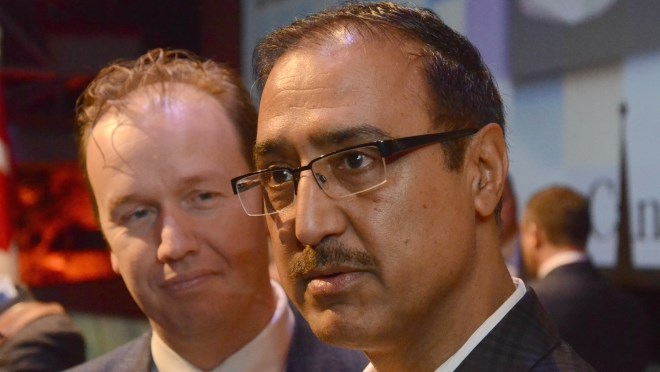The new free trade agreement with the U.S. and Mexico will benefit Northern Ontario by guaranteeing access to markets for industries such as mining and forestry, Minister of Natural Resources Amarjeet Sohi said in Sudbury on Oct. 30.
The new deal, dubbed the United States-Mexico-Canada Agreement, or USMCA, replaces NAFTA, or the North American Free Trade Agreement. It outlines rules for trading a wide range of products between the three nations, and was a priority for U.S. President Donald Trump.
As an international business, mining companies need access to markets, Sohi said, and USMCA offers stability for companies looking to invest. He made the remarks at a news conference at Science North, hours after he announced a $10-million Crush It Challenge, in which mining companies are challenged to find ways to crush rocks using less energy.
"Trade remains crucial to the mines and minerals sector, to jobs and to Sudbury,” Sohi said at Science North. “That's why the USMCA is so important. The agreement means more opportunities for Canadian businesses and good, middle-class jobs for Canadian workers and their families.
“The ability of the investors to make a decision based on the predictability that exists (in the trade deal) is very important,” he added. “This agreement gives that predictability. It lays out the rules for next 18-20 years.”
The agreement also raises environmental and labour standards, meaning Canadians can be more competitive with our southern neighbours, Sohi said.
“Whenever you have lower environmental standards and lower labour standards in other jurisdictions, they drive away investment in your country,” he said. “I think by having better environmental standards in place in the new agreement, and better labour standards in place in the new agreement, I think it gives us that competitive advantage than other countries, such as Mexico particularly, or some states in the in the U.S. that don't have strong labour standards in place.”
Sohi was introduced by Michael Mcnamara, chair of the Greater Sudbury Chamber of Commerce. Mcnamara said the new trade deal is good for Canadian businesses.
“The chamber network advocated strongly in support of a renewed trade agreement, and we applaud the government for listening,” he said. “We would like to also congratulate … Canada's negotiating team for delivering on an agreement that remains trilateral – and for doing so under challenging conditions.”
Canada has benefited from free trade, Sohi said, and the U.S. and Mexican economies have seen strong growth since NAFTA was signed in 1993. Other trade deals have benefited us as well, he said.
“Canada is the only G7 country that has an agreement with every other G7 country,” he said. “That opens up a much wider market for our economy and our businesses to grow.”
To gain leverage in the negotiations, Trump slapped tariffs on Canadian steel and aluminum, citing national security. Sohi said that didn't reflect reality.
“I think it's very unfortunate that the president thinks that Canada is a threat to to American sovereignty, or American security,” he said. “We have been strong allies with each other. We have fought wars together. We we have families on both sides of the border because our economies are so integrated.”




